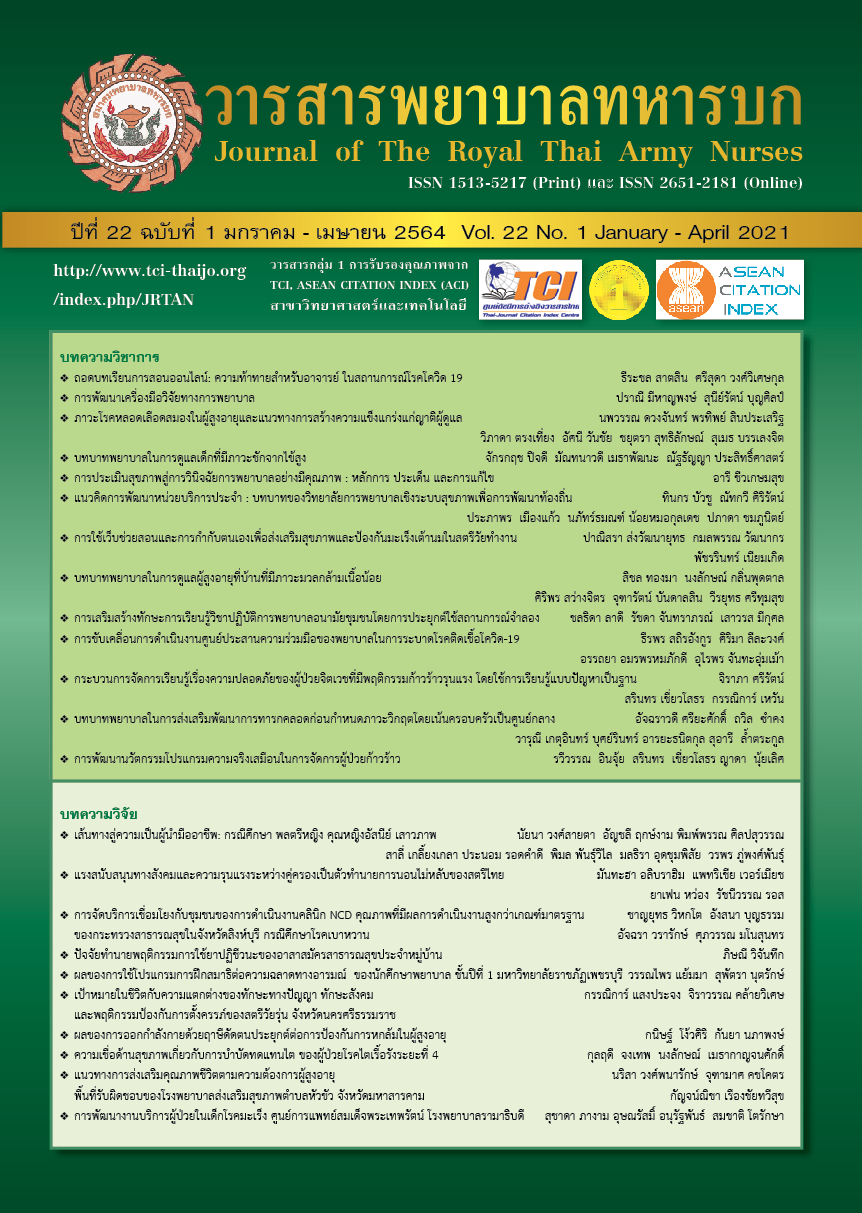Development of Virtual Reality Program in Managing Aggressive Patients
Keywords:
Innovative teaching strategy, Virtual reality program, Managing aggressive patientsAbstract
Aggressive patient management is a risk which nursing students frequently face during the practical section of the Mental Health and Psychiatric Nursing. A previous evaluation found that the students showed fear, anxiety, and a lack of confidence in providing care to aggressive patients. Although the students study the theory, students lack real life experience in dealing with aggressive patient management. Therefore, the Mental Health and Psychiatric Nursing Department of the Royal Thai Army Nursing College have emphasized the importance of preparing knowledge and skills for enhancing student confidence prior to implementing nursing cares to aggressive patients. The author has developed a virtual reality program using case simulation for the management of aggressive patients. This allows the students to self-train and develop the required skills before dealing with real patients. Post-use assessment of the virtual reality program in 99 third-year nursing students indicated that the effectiveness index (E.I.) of the program is 0.5679. Knowledge on aggressive patient management of the nursing students increased. The results indicated a good satisfaction level (mean = 4.36, S.D. = 0.382).
Downloads
References
Anderson A, West SG. Violence against mental health professionals: when the treater becomes the victim. Innovation Clinic Neuroscience 2011; 8:34-9.
Drach-ZahavyA,GoldblattH,GranotM,Hirschmann S, Kostinski H. Control: patients’aggression in psychiatric settings. Qualitative Health Research 2012; 22:43-53.
Department of Mental Health. 2019 ANNUAL REPORT. 2562. Bangkok: Lamom Publishing. 2019.
Phramongkutklao Hospital. Aggressive behavior statistics in psychiatric inpatient setting. Nursing Division. Bangkok: Phramongkutklao Hospital. 2014.
Akkaradech Klinpiboon, Natladda Numpa, Theerapa Thanee, Supaporn Jansam. The development of aggressive and violent behavior management model in psychiatric patients for nursing personnel in general and the community hospitals. Journal of Mental Health of Thailand 2018;26(3):207-219. (in Thai)
Samari E, Seow E, Chua B Y, Ong H L, Abdin E, Chong S A, Subramaniam M. Stigma towards people with mental disorders: Perspectives of nursing students. Archives of Psychiatric Nursing, 2018.
Janchai Maneewong, Khaunruetai Panthu. The experience in Training Works and Adaptation of Student Nurses from Borderland Provinces in the Southern Area of Thailand Boromarajonani College of Nursing Suphanburi. Journal of Nursing and Education 2013; 6(3): 42-57. (in Thai)
Slemon A, Jenkins E, Bungay V. Safety in psychiatric inpatient care: The impact of risk management culture on mental health nursing practice. Nursing Inquiry 2017; 24:12199.
Searby A, Snipe J, Maude P. Aggression Management Training in Undergraduate Nursing Students: A Scoping Review. Issues Mental Health Nurse 2019; 40(6):503-510.
Kidd L, Knisley S J, Morgan K I. Effectiveness of a Second Life (R) Simulation as a Teaching Strategy for Undergraduate Mental Health Nursing Students. Journal of Psychosocial Nursing and Mental Health Services 2012; 50(7):28-37.
Pamela C, Smith DN, Bernita K, Hamilton P. The Effects of Virtual Reality Simulation as a Teaching Strategy for Skills Preparation in Nursing Students. Clinical Simulation in Nursing, 2015; 11(1): 52-58.
Pichit Ritjaroon. Research techniques for learning development. 2561. Bangkok:Chulalongkorn Printing Press University.
Montatip Chaiprem. Preliminary report: Aggressive behavior of psychiatric patients and nursing staff management. Journal of Mental Health of Thailand 2013; 21(1):57-65. (in Thai)
Pipat P. The Effects of a Cognitive Behavior Therapy Program on The Aggressive Behaviors Among Patients with Amphetamine Dependence. Journal of The Royal Thai Army Nurses. 2017; 18. 207-214. (in Thai)
Garriga M, Pacchiarotti I, Hidalgo D, Bernardo M & Vieta E. Detection and management of agitation in psychiatry: A Delphi expert consensus study. European Psychiatry 2016; 33:170.
Korkarn Siriwatthano, Vineekarn Kongsuwan, Tanomsri Intanon, Development of a Clinical Nursing Practice Guideline for Schizophrenia Patients with Aggressive Behaviors in the Accident and Emergency Unit at Phrasaeng Hospital, Suratthani Province. Princess of Naradhiwas University Journal. 2017. 9 (3). 25-36.
Injui R. Chiewsothorn S. Prasittivatechakool A. The Effects of Using Gamification Learning Activities on Learning Motivation and Satisfaction among The Royal Thai Army Nursing Students. Journal of The Royal Thai Army Nurses. 2020;21(2):377-88. (in Thai)
Chaleoykitti S, Chiewsothorn S, Nuyleis Y. The Development of an Innovative Learning Method with Augmented Reality Applications on Smartphone. Rama Nurs J 2019;29(1): 5-11. (in Thai)
Downloads
Published
How to Cite
Issue
Section
License
บทความหรือข้อคิดเห็นใดใดที่ปรากฏในวารสารพยาบาลทหารบกเป็นวรรณกรรมของผู้เขียน ซึ่งบรรณาธิการหรือสมาคมพยาบาลทหารบก ไม่จำเป็นต้องเห็นด้วย
บทความที่ได้รับการตีพิมพ์เป็นลิขสิทธิ์ของวารสารพยาบาลทหารบก
The ideas and opinions expressed in the Journal of The Royal Thai Army Nurses are those of the authors and not necessarily those
of the editor or Royal Thai Army Nurses Association.






